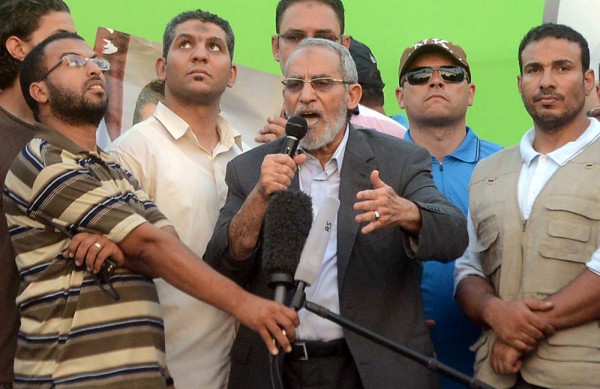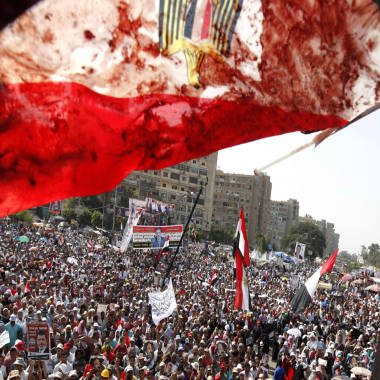
AP, file
The Muslim Brotherhood's General Guide Mohammed Badie speaks onstage as military helicopters fly overhead before tens of thousands of supporters in Cairo on July 5. A group within the Brotherhood have launched a petition of no-confidence in Badie, who is known as "Morshid."
By Charlene Gubash, Producer, NBC News
CAIRO - Just last month, the Islamist Muslim Brotherhood had a lock on Egypt?s presidency and parliament. ?
Now, after mass protests backed by the country?s military swept President Mohammed Morsi from power, the organization venerated throughout the Muslim world for its discipline, ministry to the needy and rejection of violence is showing signs of fracturing.
A group of about 1,400?within the Brotherhood have launched a petition of no-confidence in Mohamed Badie, the Supreme Leader of the Muslim Brotherhood, known as ?Morshid.? ?
In Roman Catholic terms, that would be akin to the faithful voting to impeach Pope Francis.?
Ahmed Yehia, a lawyer, Brotherhood member and coordinator of the new movement, ?Brotherhood Without Violence,? said Morsi abandoned Islam in favor of a naked pursuit of power after he became Egypt?s first democratically elected leader in 2012."

Mohamed Abd El Ghany / Reuters
Days of massive protests and a military ultimatum forced the country's first democratically elected president from office.
"After (Morsi?s government) came to power, they changed and forgot about Islam and tolerance and the call to Islam, and entered into a stage of how to protect themselves, find a safe exit and regain power," Yehia said on a popular liberal Egyptian satellite channel on Friday.
The breaking point for Yehia came on July 8, the day about 50 Brotherhood protesters and four soldiers were killed in a gun battle outside the Republican Guard Club, where many believe Morsi is being held.?
"None of the (Brotherhood) leaders were there," Yehia said during a telephone interview. "But the day before, they told protesters, ?You have to get Morsi out, with our own body and blood.? And told them to march (on the Republican Guard Club). After morning prayer, Brotherhood sympathizers started violent actions toward the Republican Guard to release Morsi, and the guards responded."?
On Monday Egypt's public prosecutor ordered the arrest of seven senior Muslim Brotherhood and Islamist figures on charges accusing them of "inciting violence, funding violent acts, and thuggery" during the days before and after Morsi was deposed.?
The challenge to the leadership of the Brotherhood -- a movement tied to Morsi?s Freedom and Justice Party -- will probably transform the 85-year-old organization, said Gamal Abdel Gawad, political science professor at the American University of Cairo.?

Ed Giles / Getty Images, file
A man reacts after seeing the body of a family member allegedly killed during a shooting at the site of a pro-Mohammed Morsi sit-in in front of the headquarters of the Egyptian Republican Guard in Cairo on July 8.
"It is beginning to be serious now," he said. "Critics are really vocal these days ? people who have strong credentials within the organization, not the secular enemy. This kind of criticism is feeding into new feelings of disappointment among members and has taken the shape of (opposition) groups, beginning a long process transformation (and) disintegration.?
The transformation comes after what is widely seen as a disastrous year in power by longtime Brotherhood leader Morsi, during which the economy went into a tailspin and security worsened.?
A day after the July 8 clashes, Brotherhood Without Violence launched their petition against the group's supreme leader Badie and claim to have collected a total of 1,900 signatures. There are no official numbers for Brotherhood membership in Egypt, but the movement is estimated to count around 100,000 hardcore loyalists, and between 400,000 and 700,000 rank-and-file members.
"(The leadership) incited violence ? They pushed the youth away from any (party) positions and used them as a tool in violation of their own principles," Yehia said in reference to the Brotherhood?s longtime rejection of violence. ??We have to regain the trust of the public by returning to the old tolerant, non-violent way and dealing with the public as we always have, through social services.?
The group has also joined forces with Ahrar al Ikhwan, or ?Free Brothers,? a second opposition group within the Brotherhood.
Thousands protested the military's removal of President Mohamed Morsi, demanding that he be reinstated. NBC's Brian Williams reports.
A statement on the "Free Brothers" Facebook page announced "the defection not from the Brotherhood, but from our leaders who are asking us to do what contradicts the teachings of our religion and the interests of our country." ?
The Muslim Brotherhood did not respond to requests for comment on the opposition movements. ?Mourad Ali, media advisor for the political wing of the Freedom and Justice Party said he had only read about the news opposition groups in the media and didn?t know any of any of the people mentioned.?
On local television, a Brotherhood government minister has dismissed the Free Brothers as ?imaginary.?
Meanwhile, the new group has moved quickly to find a credible leader, former parliamentarian, Zacharia Ganaini.Whatever happens to the Brotherhood after the latest bout of unrest in Egypt, it will emerge a different organization, Gawad said.
?The Muslim Brotherhood will definitely be transformed in some way but it won?t disappear,? he said.?
NBC News' Afaf Fawzi contributed to this report.
Related:
lifehouse al gore la dodgers lawrence o donnell magic johnson jetblue pilot solicitor general
No comments:
Post a Comment
Note: Only a member of this blog may post a comment.